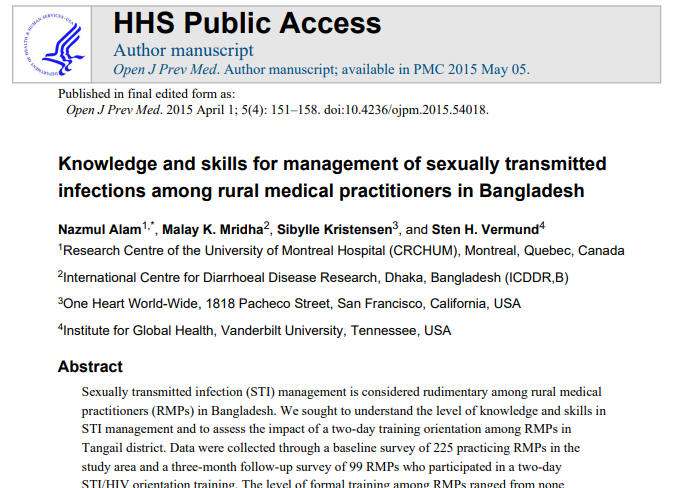Knowledge and skills for management of sexually transmitted infections among rural medical practitioners in Bangladesh
This study was conducted by researchers at icddrb (currently affiliated with BRAC James P Grant School of Public Health, BRAC University), University of Montreal Hospital, Vanderbilt University and One Heart- Worldwide. Sexually transmitted infection (STI) management is considered rudimentary among rural medical practitioners (RMPs) in Bangladesh. We sought to understand the level of knowledge and skills in STI management and to assess the impact of a two-day training orientation among RMPs in Tangail district. Data were collected through a baseline survey of 225 practicing RMPs in the study area and a three-month follow-up survey of 99 RMPs who participated in a two-day STI/HIV orientation training. The level of formal training among RMPs ranged from none (22.7%), to paramedical training (14.7%) and local medical assistant training (62.6%). The baseline survey revealed a low level of STI/HIV knowledge and misconceptions about the transmission of STI/HIV among RMPs. RMPs mostly prescribed first line antibiotics for treatment of common reproductive tract infections (RTIs) including STIs, but they rarely prescribed the correct dosages according to the national RTI/STI management guidelines. Only 3% of RMPs were able to correctly answer all four HIV transmission (unprotected sexual intercourse, blood transfusion, needle sharing and mother to child transmission) questions at baseline, while 94.9% of RMPs answered all four correctly at three months following the training (p=0.001). Only 10% of RMPs reported suggesting the recommended drug (azithromycin) and only 2% mentioned about the recommended dosage (2gm single dose) for the treatment of urethritis/cervicitis; compared to 49.5% suggested azithromycin at follow-up with 39.4% mentioned the recommended 2gm single dose (p=0.001). Our study found low level of knowledge and poor practices related RTI/STI management among RMPs. Short orientation training and education intervention shown promise to increase knowledge and management skills for RTIs/STIs.
Full text article available at:
https://www.ncbi.nlm.nih.gov/pmc/articles/PMC4420026/pdf/nihms683437.pdf


